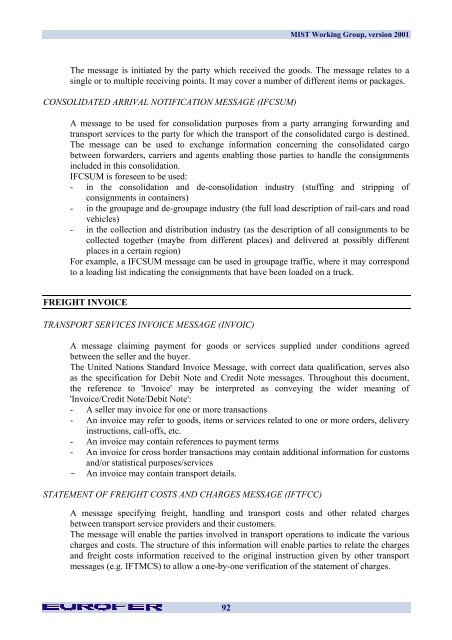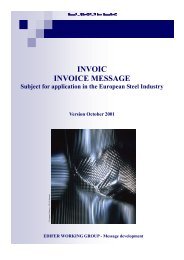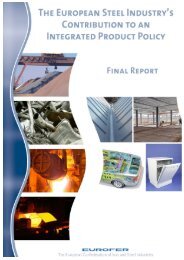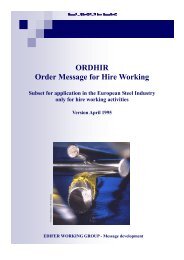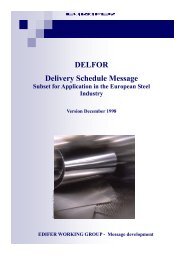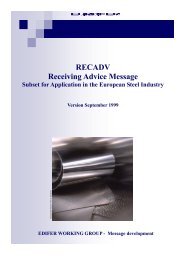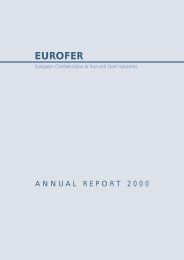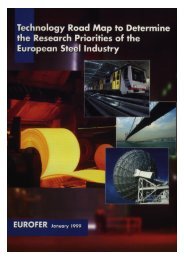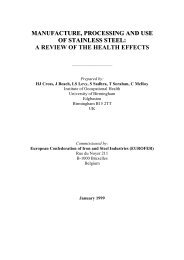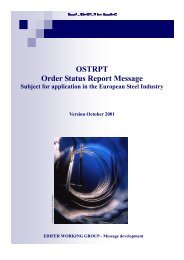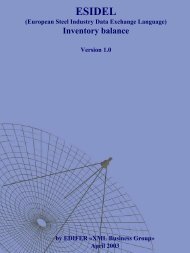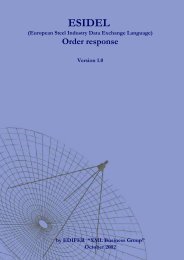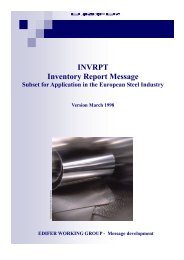Multi Industry Scenarios for Transport - Eurofer
Multi Industry Scenarios for Transport - Eurofer
Multi Industry Scenarios for Transport - Eurofer
Create successful ePaper yourself
Turn your PDF publications into a flip-book with our unique Google optimized e-Paper software.
92<br />
MIST Working Group, version 2001<br />
The message is initiated by the party which received the goods. The message relates to a<br />
single or to multiple receiving points. It may cover a number of different items or packages.<br />
CONSOLIDATED ARRIVAL NOTIFICATION MESSAGE (IFCSUM)<br />
A message to be used <strong>for</strong> consolidation purposes from a party arranging <strong>for</strong>warding and<br />
transport services to the party <strong>for</strong> which the transport of the consolidated cargo is destined.<br />
The message can be used to exchange in<strong>for</strong>mation concerning the consolidated cargo<br />
between <strong>for</strong>warders, carriers and agents enabling those parties to handle the consignments<br />
included in this consolidation.<br />
IFCSUM is <strong>for</strong>eseen to be used:<br />
- in the consolidation and de-consolidation industry (stuffing and stripping of<br />
consignments in containers)<br />
- in the groupage and de-groupage industry (the full load description of rail-cars and road<br />
vehicles)<br />
- in the collection and distribution industry (as the description of all consignments to be<br />
collected together (maybe from different places) and delivered at possibly different<br />
places in a certain region)<br />
For example, a IFCSUM message can be used in groupage traffic, where it may correspond<br />
to a loading list indicating the consignments that have been loaded on a truck.<br />
FREIGHT INVOICE<br />
TRANSPORT SERVICES INVOICE MESSAGE (INVOIC)<br />
A message claiming payment <strong>for</strong> goods or services supplied under conditions agreed<br />
between the seller and the buyer.<br />
The United Nations Standard Invoice Message, with correct data qualification, serves also<br />
as the specification <strong>for</strong> Debit Note and Credit Note messages. Throughout this document,<br />
the reference to 'Invoice' may be interpreted as conveying the wider meaning of<br />
'Invoice/Credit Note/Debit Note':<br />
- A seller may invoice <strong>for</strong> one or more transactions<br />
- An invoice may refer to goods, items or services related to one or more orders, delivery<br />
instructions, call-offs, etc.<br />
- An invoice may contain references to payment terms<br />
- An invoice <strong>for</strong> cross border transactions may contain additional in<strong>for</strong>mation <strong>for</strong> customs<br />
and/or statistical purposes/services<br />
- An invoice may contain transport details.<br />
STATEMENT OF FREIGHT COSTS AND CHARGES MESSAGE (IFTFCC)<br />
A message specifying freight, handling and transport costs and other related charges<br />
between transport service providers and their customers.<br />
The message will enable the parties involved in transport operations to indicate the various<br />
charges and costs. The structure of this in<strong>for</strong>mation will enable parties to relate the charges<br />
and freight costs in<strong>for</strong>mation received to the original instruction given by other transport<br />
messages (e.g. IFTMCS) to allow a one-by-one verification of the statement of charges.


